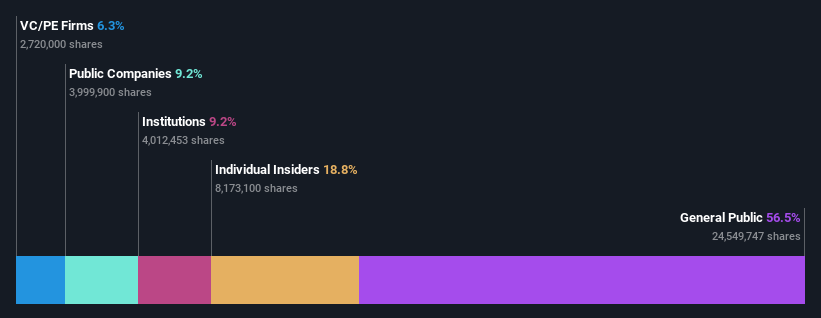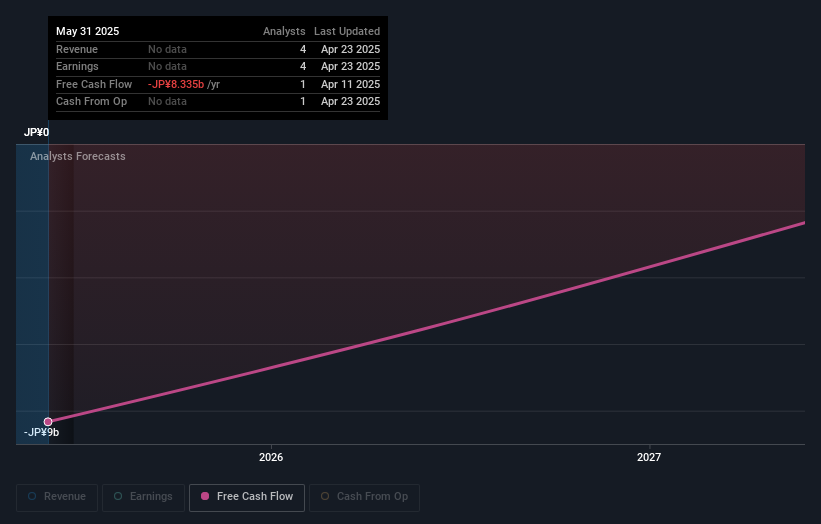- Japan
- /
- Aerospace & Defense
- /
- TSE:5595
Retail investors invested in Institute for Q-shu Pioneers of Space, Inc. (TSE:5595) up 11% last week, insiders too were rewarded

Key Insights
- Institute for Q-shu Pioneers of Space's significant retail investors ownership suggests that the key decisions are influenced by shareholders from the larger public
- A total of 25 investors have a majority stake in the company with 50% ownership
- Insiders own 19% of Institute for Q-shu Pioneers of Space
A look at the shareholders of Institute for Q-shu Pioneers of Space, Inc. (TSE:5595) can tell us which group is most powerful. With 56% stake, retail investors possess the maximum shares in the company. That is, the group stands to benefit the most if the stock rises (or lose the most if there is a downturn).
While retail investors were the group that benefitted the most from last week’s JP¥6.6b market cap gain, insiders too had a 19% share in those profits.
Let's delve deeper into each type of owner of Institute for Q-shu Pioneers of Space, beginning with the chart below.
Check out our latest analysis for Institute for Q-shu Pioneers of Space

What Does The Institutional Ownership Tell Us About Institute for Q-shu Pioneers of Space?
Institutions typically measure themselves against a benchmark when reporting to their own investors, so they often become more enthusiastic about a stock once it's included in a major index. We would expect most companies to have some institutions on the register, especially if they are growing.
We can see that Institute for Q-shu Pioneers of Space does have institutional investors; and they hold a good portion of the company's stock. This suggests some credibility amongst professional investors. But we can't rely on that fact alone since institutions make bad investments sometimes, just like everyone does. It is not uncommon to see a big share price drop if two large institutional investors try to sell out of a stock at the same time. So it is worth checking the past earnings trajectory of Institute for Q-shu Pioneers of Space, (below). Of course, keep in mind that there are other factors to consider, too.

We note that hedge funds don't have a meaningful investment in Institute for Q-shu Pioneers of Space. With a 9.2% stake, CEO Shunsuke Onishi is the largest shareholder. With 6.6% and 6.3% of the shares outstanding respectively, SKY Perfect JSAT Holdings Inc. and INCJ, Ltd. are the second and third largest shareholders.
On studying our ownership data, we found that 25 of the top shareholders collectively own less than 50% of the share register, implying that no single individual has a majority interest.
While studying institutional ownership for a company can add value to your research, it is also a good practice to research analyst recommendations to get a deeper understand of a stock's expected performance. There are a reasonable number of analysts covering the stock, so it might be useful to find out their aggregate view on the future.
Insider Ownership Of Institute for Q-shu Pioneers of Space
The definition of company insiders can be subjective and does vary between jurisdictions. Our data reflects individual insiders, capturing board members at the very least. Company management run the business, but the CEO will answer to the board, even if he or she is a member of it.
I generally consider insider ownership to be a good thing. However, on some occasions it makes it more difficult for other shareholders to hold the board accountable for decisions.
It seems insiders own a significant proportion of Institute for Q-shu Pioneers of Space, Inc.. Insiders have a JP¥13b stake in this JP¥67b business. We would say this shows alignment with shareholders, but it is worth noting that the company is still quite small; some insiders may have founded the business. You can click here to see if those insiders have been buying or selling.
General Public Ownership
The general public, mostly comprising of individual investors, collectively holds 56% of Institute for Q-shu Pioneers of Space shares. With this amount of ownership, retail investors can collectively play a role in decisions that affect shareholder returns, such as dividend policies and the appointment of directors. They can also exercise the power to vote on acquisitions or mergers that may not improve profitability.
Private Equity Ownership
With a stake of 6.3%, private equity firms could influence the Institute for Q-shu Pioneers of Space board. Some investors might be encouraged by this, since private equity are sometimes able to encourage strategies that help the market see the value in the company. Alternatively, those holders might be exiting the investment after taking it public.
Public Company Ownership
We can see that public companies hold 9.2% of the Institute for Q-shu Pioneers of Space shares on issue. We can't be certain but it is quite possible this is a strategic stake. The businesses may be similar, or work together.
Next Steps:
While it is well worth considering the different groups that own a company, there are other factors that are even more important. To that end, you should learn about the 2 warning signs we've spotted with Institute for Q-shu Pioneers of Space (including 1 which can't be ignored) .
Ultimately the future is most important. You can access this free report on analyst forecasts for the company.
NB: Figures in this article are calculated using data from the last twelve months, which refer to the 12-month period ending on the last date of the month the financial statement is dated. This may not be consistent with full year annual report figures.
New: AI Stock Screener & Alerts
Our new AI Stock Screener scans the market every day to uncover opportunities.
• Dividend Powerhouses (3%+ Yield)
• Undervalued Small Caps with Insider Buying
• High growth Tech and AI Companies
Or build your own from over 50 metrics.
Have feedback on this article? Concerned about the content? Get in touch with us directly. Alternatively, email editorial-team (at) simplywallst.com.
This article by Simply Wall St is general in nature. We provide commentary based on historical data and analyst forecasts only using an unbiased methodology and our articles are not intended to be financial advice. It does not constitute a recommendation to buy or sell any stock, and does not take account of your objectives, or your financial situation. We aim to bring you long-term focused analysis driven by fundamental data. Note that our analysis may not factor in the latest price-sensitive company announcements or qualitative material. Simply Wall St has no position in any stocks mentioned.
About TSE:5595
Institute for Q-shu Pioneers of Space
Institute for Q-shu Pioneers of Space, Inc.
Very low with weak fundamentals.
Market Insights
Community Narratives



